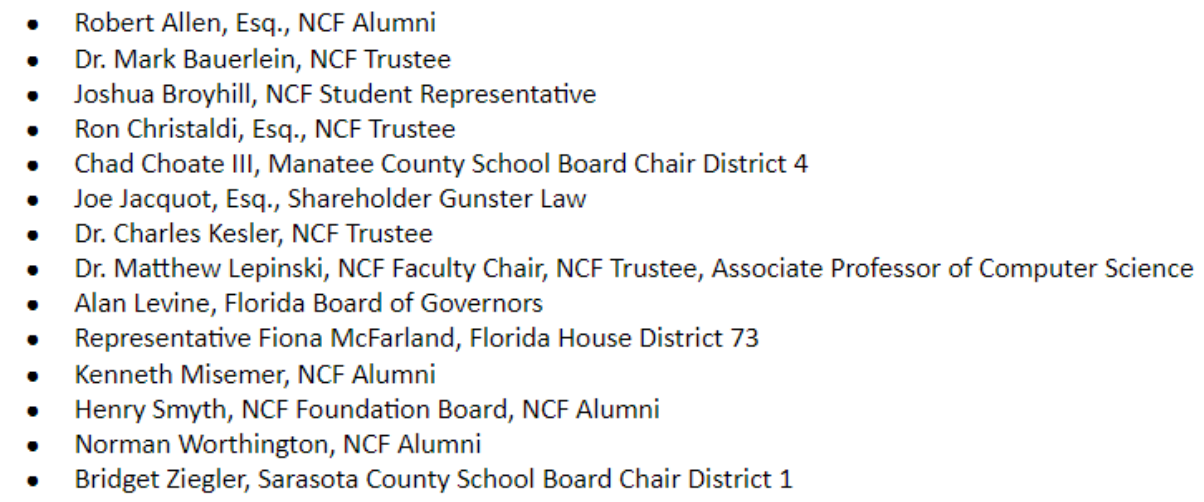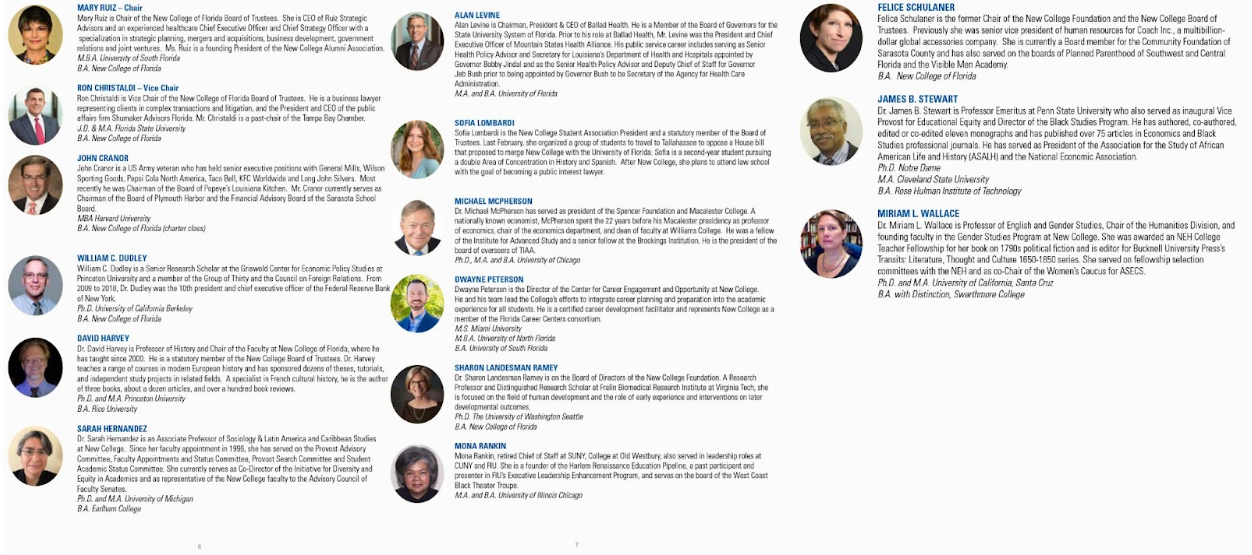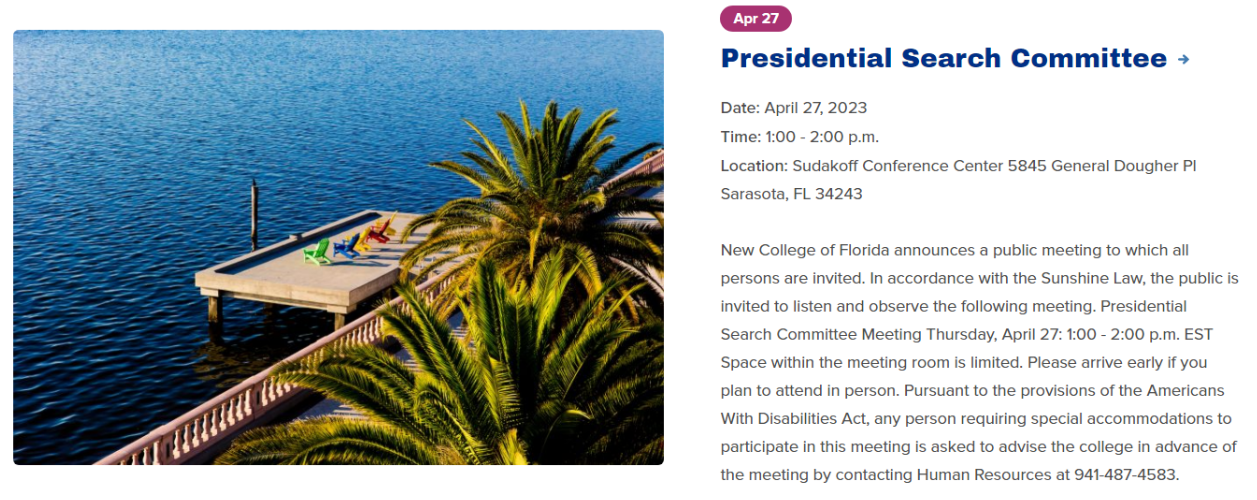Search committees play a key role in selecting the right candidate to lead a college or university. Florida State Regulation 1.002 specifies the broad composition of these committees, and at New College, they are traditionally a mix of trustees, faculty members, staff, students, alumni and community members who identify and evaluate potential candidates for the position of president. Executive recruitment firms have also been used to help identify strong candidates. In the early stages of a search they can make low-key inquiries for the committee among prospects who might not want their employers to know they are open to moving on. With the recent firing of former President Patricia Okker and the second of two interim presidents currently in place, New College is in the market for a candidate worthy of filling the role full-time.
According to the established presidential search process, the committee puts together a pool of candidates, reviews applications and selects a list of their top picks for interviews. These interviews may be conducted in person or virtually, and typically involve a mix of behavioral and situational questions designed to assess the candidate’s leadership style. Additionally, in accordance with Sunshine Law, the meetings for these search committees and the interviews they conduct are announced publicly and include opportunities for members of the public to attend and offer comments to committee members throughout the process.
After the process is complete, the search committee recommends candidates to the college’s Board of Trustees (BOT). It is important to note that the search committee’s role is advisory in nature, but its input is critical in ensuring that the board has access to a diverse pool of candidates whose qualifications have been thoroughly evaluated. The BOT reviews the recommendation and decides on a candidate to put forward for confirmation by the Board of Governors (BOG).
To get some insight into the most recent New College presidential search committee, the Catalyst spoke with faculty representative and Associate Professor of Computer Science Matthew Lepinski, who is also the Chair of the New College Faculty and a member of the BOT.
“There’s always representation from the BOT,” Lepinski said. “There’s always representation from students, representation from faculty, representation from law firms and representation from the local community. […] All of those groups are always represented, but on the other hand, exactly how many people from each group and who exactly is on the committee seems to vary a lot from committee to committee.”
Among the biggest challenges is ensuring that the committee is representative of the college’s diverse stakeholder groups, which can be particularly challenging. On Apr. 7, Communications and Marketing announced the members of the 2023 Presidential Search Committee, selected by BOT Chair Debra Jenks.

Communications and Marketing also announced that Trustee Matthew Spalding will chair the committee, as he is also the Kirby Professor in Constitutional Government at Hillsdale College and the Dean of the Van Andel Graduate School of Government at Hillsdale College’s Washington, D.C., campus. A web page has been set up for the committee, which includes biographies of each member as well as an email contact for the committee.
When asked about the formation of the committee, Lepinski said that he wasn’t sure when exactly planning had started.
“Richard Corcoran’s first day as Interim President was Feb. 27, so it was clear at that point that we needed to do a search for a permanent president,” Lepinski stated. “I expect that basically as soon as Corcoran’s started and we have solved the immediate problem of having an interim president, that work began on the process of putting together a search for a permanent president, but I don’t know the exact timetable. My guess would have been like very early March.
“Also, I know that Gov. Alan Levine was actually at our Feb. 28 BOT meeting and he was the member of the Board of Governors (BOG) who’s helping us with this,” Lepinski continued.
Lepinski also elaborated on the fact that although the process of the presidential search committee aims to be open and include a variety of opinions, some parts of the process must be withheld for the privacy of those involved.
“My recollection is that the beginning part of the initial screening of applicants is done privately so that we’re not broadcasting the names of everyone who’s thinking about leaving their current employer,” Lepinski said. ”Having some degree of transparency is also important. I think there’s an attempt made to balance the privacy for the applicants versus the need for transparency in the process.”
The process consists of many steps that must be followed in order to achieve an unbiased selection. The University of Central (UCF) Florida has created a document which lays out their process of presidential search and selection, which gives an overview and guidelines of what this process entails.
The search committee that selected Okker as President in Spring 2021 was made up of 15 members. Among the biggest differences between this previous committee and the current one are the faculty and student representatives who were selected. Okker’s search committee included former New College Student Alliance (NCSA) President Sofia Lombardi; however, the student representative for the current committee instead includes third-year transfer student Joshua Broyhill, who is not a member of the NCSA. The Catalyst reached out to Broyhill, who did not respond to a request for an interview.
The previous committee also included three faculty representatives, while the current committee includes only one.

One recent example of a university search committee in Florida was the successful search for a new leader at Florida State University (FSU). In 2013, FSU began the search for a new President following the retirement of Dr. Eric Barron. The search committee was made up of 27 members, including trustees, faculty members, staff, students and community leaders mirroring the structure of other Florida presidential search committees.
The committee developed a comprehensive profile of the ideal candidate, which included a focus on academic excellence, leadership and community engagement. The committee then advertised the position widely and received more than 90 applications from candidates across the country. After reviewing the applications, they selected four candidates for interviews. These interviews were conducted over a period of several days and included a mix of behavioral and situational questions. The committee deliberated and ultimately recommended Dr. John Thrasher, a former State Senator and member of the Florida House of Representatives. He took office in 2014.
New College’s presidential search committee will have its first public meeting on Apr. 27 in the Sudakoff Conference Center from 1 p.m. to 2 p.m. The Catalyst anticipates that more information will be provided at that time.

